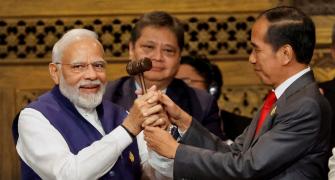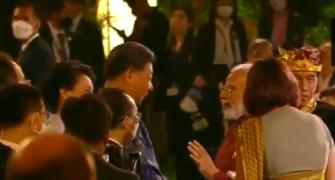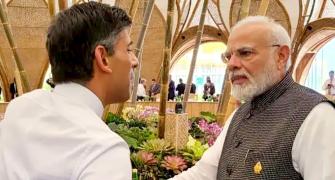The G20's Bali Declaration Wednesday acknowledged differences among members on the Russia-Ukraine war but stressed that it was essential to adhere to international law, including protection of civilians caught in conflicts.

The members of the grouping made it clear that they were against the use or threat of use of nuclear weapons and sought "peaceful resolution" of conflicts.
But the "G20 Bali Leaders' Declaration" also reflected the contentious debate that went into drafting it, with Indonesian President Joko Widodo acknowledging this at his press conference at the end of the two-day summit.
"Today's era must not be of war," the declaration said, echoing the remark made by Prime Minister Narendra Modi during his bilateral meeting with Russian President Vladimir Putin on the margins of the SCO summit in September.
Talking to reporters, foreign secretary Vinay Kwatra said that the Indian delegation, guided by Prime Minister Modi, played a key role in bringing about a “consensus”.
India on Wednesday took over the presidency of the summit for a year with Modi promising an “inclusive” and “ambitious” agenda for the group that includes the world's major economies.
Reflecting the divisions among its members, the declaration said the member nations “reiterated our national positions” as expressed at the UN Security Council.
"Most" members strongly condemned the war in Ukraine, it said but noted that there were “other views” and assessments of the situation.
As Widodo noted, the war occupied only a small part of the document. But it appeared to have overshadowed the main theme of the summit – the world's fight against the economic aftermath of the Covid pandemic
The Indonesian president acknowledged that there had been apprehension over whether the members will even agree to a common document.
Russian President Putin had opted out of the Summit and his foreign minister, Sergei Lavrov, who represented him, left a day before the declaration was released.
Russia launched a special military operation in Ukraine on February 24. The Russian action has been widely condemned by the US-led West.
At one session, Ukrainian President Volodymyr Zelensky virtually addressed the leaders, seeking an end to the “destructive war” but in a just manner. He pointedly called the gathering the "G19".
The G20 comprises 19 countries: Argentina, Australia, Brazil, Canada, China, France, Germany, India, Indonesia, Italy, Japan, South Korea, Mexico, Russia, Saudi Arabia, South Africa, Turkey, the UK, the USA and the European Union.
The declaration said the summit was held at “a time of unparalleled multidimensional crises”.
"We have experienced the devastation brought by the Covid-19 pandemic, and other challenges including climate change, which has caused economic downturn, increased poverty, slowed global recovery, and hindered the achievement of the Sustainable Development Goals,” it said.
And in para-3, the 52-para document dived into the contentious territory of the war in Ukraine.
"Most members strongly condemned the war in Ukraine and stressed it is causing immense human suffering and exacerbating existing fragilities in the global economy -- constraining growth, increasing inflation, disrupting supply chains, heightening energy and food insecurity, and elevating financial stability risks,” it added.
"There were other views and different assessments of the situation and sanctions,” it said in an apparent reference to countries that have stopped short of outright condemnation of Russia.
The declaration recognised that the G20 is “not the forum to resolve security issues” but agreed that “security issues can have significant consequences for the global economy”.
The declaration was clear on the need to uphold international laws but avoided any attempt at identifying the rule-breaker in the Russian-Ukraine context.
"It is essential to uphold international law and the multilateral system that safeguards peace and stability,” it stated.
"This includes defending all the Purposes and Principles enshrined in the Charter of the United Nations and adhering to international humanitarian law, including the protection of civilians and infrastructure in armed conflicts.”
It added that the "use or threat of use of nuclear weapons is inadmissible".
And then came the part reflecting India's contribution towards building a consensus of sorts among the members.
"The peaceful resolution of conflicts, efforts to address crises, as well as diplomacy and dialogue, are vital. Today's era must not be of war," the document said, echoing Modi's remarks at the SCO and the G20 summits.








